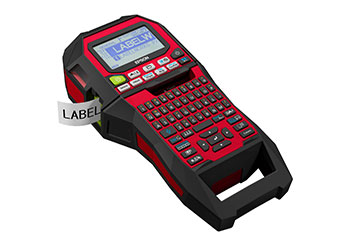Whether photographs printed at home, documents printed at the office, posters printed for commercial use, or textiles with printed patterns, prints are all around us. A tremendous number of labels are also printed at industrial and construction sites, particularly during equipment and facilities maintenance and installations, to identify cables, equipment, and so forth. Seeking to meet every printing need, Epson decided to enter this industrial label printer market.
Epson launched the LabelWorks LW-Z900/LW-PX900*, the company’s first hand-held label printer for industry, in August 2015 in the United States and in December in Europe. This label printer, designed based on customer needs, sports numerous features that save time, reduce running costs, and increase business efficiency.
* Sold as the LW-PX900 in North America and as the LW-Z900 in other regions.
One printer for all your label printing needs
Industrial labels come in a wide variety of types. They may be affixed to cables, pipes, hoses, and wiring installations. They may be used to identify items or hazards. Different labels are needed for different uses. While previous label printers were versatile, usability was less than ideal when creating labels for cables and wiring installations. The new LW-Z900/LW-PX900 and new types of tape were designed to meet the needs of telecom, electrical, and wiring professionals while maintaining the flexibility needed.
Labels applied to electrical installations on-site and in the field
A new addition to the tape lineup are heat-shrink tubes. Heat-shrink tubes are ideal for cable labels because of their insulative properties and because they shrink to fit cables when exposed to a blast of hot air from an industrial dryer. The LW-Z900/LW-PX900 supports tape widths ranging from 4 mm to 36 mm. Heat-shrink tubes with large diameters are also available. Users can also use heat-shrink tubes to bundle together power cables and other thick cables.
In addition, Epson introduced self-laminating cable wrap tape, which has a white print-on area and a transparent tab that wraps over and around the label, as well as die-cut labels that are pre-cut into certain shapes and magnetic-backed tape. The LW-Z900/LW-PX900 can be used to create a wide range of labels in addition to cable and wiring identification labels.
Labels of various widths
Heat-shrink tube
Self-laminating cable wrap
Magnet label
Die-cut label
Auto tape-rewind reduces tape waste and costs
Epson conducted extensive market research and analysis before entering this market. We learned that industrial users need to efficiently print a huge number of cable and wire identification labels at low cost. Epson thus added a feature to reduce tape waste.
Standard label printers leave a lead margin on the tape, starting from where the previous label was cut and extending to the location of the printhead. The LW-Z900/LW-PX900 is equipped with a newly developed auto tape-rewind feature that reduces the lead margin from 10 mm to 4 mm on standard industrial labels. The ability to reduce tape waste is an industry-leading cost saving feature.
Tape is printed after being automatically rewound.
Waste is reduced by shortening the lead margin.
Comparison of label margin widths
Large, clear print preview
Epson also sought to give the label printer industry-leading usability to maximize the efficiency with which users can create labels. One of the things we did was to make the liquid crystal display screen easier to understand. Comparable products from rivals display only text, and printed labels sometimes differed from what the user envisioned. The LW-Z900/LW-PX900 eliminates this problem with a large LCD screen that shows you at a glance the print settings, the text that will be printed on the label, and a preview image of the label.
Designed and built for easy to use in the field.
The LW-Z900/LW-PX900 is equipped with a variety of features to help users quickly and easily print in the field. One of these is Drop-Stop. When a standard label printer is set to print continuously, the labels are printed, cut, and ejected, falling to the floor. Users have to pick up and organize the labels, which can get out of sequence and become lost. Drop-Stop, however, holds labels after they are cut so that they do not fall out of the printer.
Moreover, a feature called Pick & Print automatically pauses a job after printing and cutting the first label in a series and resumes printing/cutting when the label is removed. This eliminates the need to repeatedly press the print button.
Where there is no desk or table, you can use the optional magnetic feet to mount the LW-Z900/LW-PX900 on a metal surface to free up your hands for better productivity.
The next label is automatically printed after a sensor detects that the previous label has been pulled from the printer.
Optional magnetic feet allow you to mount the printer on a metal surface.
A handle offers convenient portability, and the shape and compact body of the printer make it easy to hold and operate in places where there is nothing on which to mount it. In addition to all these features, the printer is made for demanding environments, with rugged, industrial-grade, high-impact plastic that meets U.S. military standard drop test* specifications.
* The LW-Z900/LW-PX900 conforms to MIL-STD-810F, Procedure IV (Transit Drop). This drop test requires that samples of the same test item survive a total of 26 drops (on 8 corners, 12 edges, and 6 faces) from a height of 122 cm. These drops can be divided among up to five samples.
Epson is committed to penetrating every corner of the printing market. To do so we are developing innovative products and business models that meet the needs of customers in emerging economies and the digital printing needs of customers in the commercial, industrial, home, and office sectors.






























